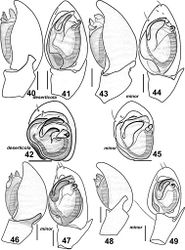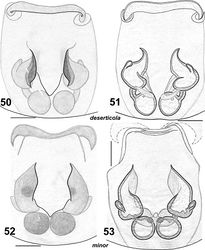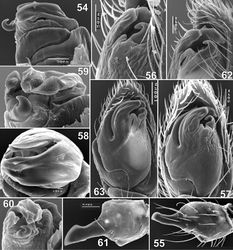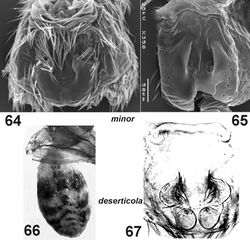Haplodrassus minor
| Notice: | This page is derived from the original publication listed below, whose author(s) should always be credited. Further contributors may edit and improve the content of this page and, consequently, need to be credited as well (see page history). Any assessment of factual correctness requires a careful review of the original article as well as of subsequent contributions.
If you are uncertain whether your planned contribution is correct or not, we suggest that you use the associated discussion page instead of editing the page directly. This page should be cited as follows (rationale):
Citation formats to copy and paste
BibTeX: @article{Kovblyuk2012ZooKeys205, RIS/ Endnote: TY - JOUR Wikipedia/ Citizendium: <ref name="Kovblyuk2012ZooKeys205">{{Citation See also the citation download page at the journal. |
Ordo: Araneae
Familia: Gnaphosidae
Genus: Haplodrassus
Name
Haplodrassus minor (O. P.-Cambridge, 1879) – Wikispecies link – ZooBank link – Pensoft Profile
- Haplodrassus minor: Miller and Buchar 1977[1]: 170, pl. IV, f. 4–6 (♂).
- Haplodrassus minor: Grimm 1985[2]: 144, f. 176–178 (♂♀).
- Haplodrassus minor: Roberts 1985[3]: 66, f. 24c (♂♀).
- Haplodrassus minor: Tuneva and Esyunin 2003[4]: 232, f. 27–33 (♂♀). For a complete list of references see Platnick (2012)[5].
Records from Crimea
Kovblyuk (2006)[6].
Material
Ukraine. CRIMEA. Lenino Distr.: 1 ♀ (EMZ), Kerch peninsula, NW coast of Aktash lake, 8.06.1999, M.M. Kovblyuk. Saki Distr.: 5 ♂♂ (TNU), near Pribrezhnaya railway station, 9.05.–3.07.2000, M.M. Kovblyuk. Simferopol Distr.: 1 ♂ (TNU), Kirpichnoe Vill., 31.05.–12.06.1997, M.M. Kovblyuk; 18 ♂♂, 5 ♀♀ (YMC, TNU), Skvortsovo Vill., 27.04.–10.07.2002, M.M. Kovblyuk. Sovietsky Distr.: 1 ♂ (TNU), Uvarovka Vill., 28.04.1999, M.M. Kovblyuk. Yalta Distr.: 1 ♂ (TNU), Yalta, Nikita Vill., 13–30.05.2000, M.M. Kovblyuk.
Additional material
UKRAINE. Donetsk Area: 1 ♂ (TNU), Slavyansk Distr., Dronovka Vil., 4–8.07.2002, E.V. Prokopenko; 1 ♂, 1 ♀ (TNU), Volodarsky Distr., Nazarovka Vil., “Kamennye Mogily” Nature Reserve, N47°20', E37°06', 20.06.1983, N.Yu. Polchaninova. Nikolaev Area: 1 ♂, 1 ♀ (TNU), Ochakov Distr., Pokrovka Vil., ‘Volyzhin Les’ Department of the Chernomorsky Nature Reserve, 21.05.1987, N.Yu. Polchaninova; 2 ♂♂ (TNU), Pervomaysky Distr., Kuripchane Vil., 6.05.-8.06.2006, N.Yu. Polchaninova. Drawings from these specimens – see in Figs 43–45, 52–53. RUSSIA. Orenburg Area: 5 ♂♂ (TNU), Kuvandyk Distr., Aituar Vill., 22.05.1996, 5.07.2002, N.S. Mazura, T.K. Tuneva; 4 ♂♂, 1 ♀ (TNU), Sol-Iletsk Distr., Chybynda, 5–12.06.2000, S.L. Esyunin. POLAND. 2 ♂♂, 2 ♀♀ (TNU), “Krusne hoty a Polsko, 2001–2002, leg. Prof. E. Kula”.
Comparative material
Haplodrassus deserticola Schmidt & Krause, 1996 from the Canary Islands: 2 ♂♂, 1 ♀ (TNU), leg. et det. J. Wunderlich.
Diagnosis
This species is most similar to Haplodrassus deserticola from the Canary Islands (Figs 40–42, 50–51). Haplodrassus deserticola differs from Haplodrassus minor by having a dorsal abdominal pattern (Fig. 66). Haplodrassus minor and Haplodrassus deserticola also differ by the shape of the embolus (thick in Haplodrassus minor, andthin in Haplodrassus deserticola), terminal apophysis (thick in Haplodrassus minor, and thin in Haplodrassus deserticola), median apophysis (short in Haplodrassus minor, and long in Haplodrassus deserticola), epigyne and spermathecae.
Variations
Haplodrassus minor ishighly variable in body size and also in the shape of the bulbal apophyses, RTA (slightly indented or not indented) and the epigyne (Figs 43–65). It is interesting to note that the width of the terminal apophysis decreases with increasing longitude (i.e. from west to east) (cf. Figs 44, 47, 49, 57, 63).
Distribution
The species has a European range and is known from Portugal to Ural, north to Wales and south to Crete (Tuneva, Esyunin 2003; Helsdingen 2010[7]; Platnick 2012[5]).
Habitats
Steppes, meadows, forest strips (=shelterbelts) within steppes.
Phenology
In Crimea ♂♀ – V-VI, ♂♂ – IV, ♀♀ – VII, the peak of activity in adults occurs in May. In Britain ♂♀ – IV-VI, with the peak in June (Harvey et al. 2002[8]), a month later than in Crimea.
Taxon Treatment
- Kovblyuk, M; Kastrygina, Z; Omelko, M; 2012: A review of the spider genus Haplodrassus Chamberlin, 1922 in Crimea (Ukraine) and adjacent areas (Araneae, Gnaphosidae) ZooKeys, 205: 59-89. doi
Other References
- ↑ Miller F, Buchar J (1977) Neue spinnenarten aus der gattung Zelotes Distel und Haplodrassus Chamberlin (Araneae, Gnaphosidae). Acta Universitatis Carolinae – Biologica 6: 157-171.
- ↑ Grimm U (1985) Die Gnaphosidae Mitteleuropas (Arachnida, Aranei). Verlag Paul Parey, Hamburg and Berlin, 318 pp.
- ↑ Roberts M (1985) The spiders of Great Britain and Ireland, Volume 1: Atypidae to Theridiosomatidae. Harley Books, Colchester, 229 pp.
- ↑ Tuneva T, Esyunin S (2003) A review of the Gnaphosidae fauna of the Urals (Aranei), 3. New species and new records, chiefly from the South Urals. Arthropoda Selecta 11 (3): 223-234.
- ↑ 5.0 5.1 Platnick N (2012) Gnaphosidae_The World Spider Catalog, Version 12.5 (Fam. Gnaphosidae Pocock, 1898) http://research.amnh.org/entomology/spiders/catalog/GNAPHOSIDAE.html
- ↑ Kovblyuk M (2006) Gnaphosid spiders (Arachnida: Aranei) in Crimean fauna. Abstract of PhD thesis, Kyiv, Ukraine: Institute of Zoology Ukrainian Academy of Sciences. 22 p. [in Ukrainian]
- ↑ Helsdingen P (2010) Fauna Europaea: Araneae. Database. Version 2.2 [www.european-arachnology.org www.european-arachnology.org]
- ↑ Harvey P, Nellist D, Telfer M (Eds) (2002) Provisional atlas of British spiders (Arachnida, Araneae). Volumes 1 & 2. Biological Records Centre, Huntington, 406 pp.
Images
|



